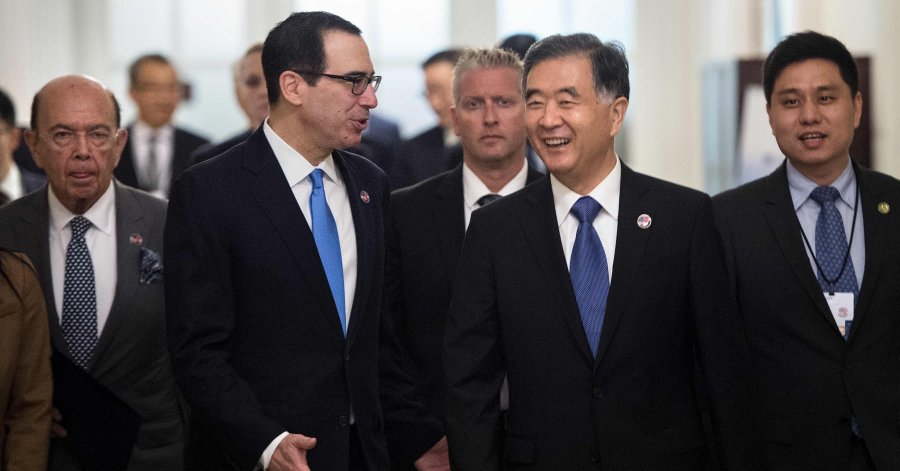
The Wall Street Journal reports that China and the U.S. have quietly started negotiating to improve U.S. access to Chinese markets, after a week filled with harsh words from both sides over Washington's threat to use tariffs to address trade imbalances, people with knowledge of the matter said.The talks, which cover wide areas including financial services and manufacturing, are being led by Liu He, China's economic czar in Beijing, and U.S. Treasury Secretary Steven Mnuchin and U.S. trade representative Robert Lighthizer in Washington.In a letter Messrs. Mnuchin and Lighthizer sent to Mr. Liu late last week, the Trump administration set out specific requests that include a reduction of Chinese tariffs on U.S. automobiles, more Chinese purchases of U.S. semiconductors and greater access to China's financial sector by American companies, the people said. Mr. Mnuchin is weighing a trip to Beijing to pursue the negotiations, one of these people said.Mr. Mnuchin on Saturday called Mr. Liu, President Xi Jinping's top economic adviser, whose promotion as vice premier during the just-concluded annual legislative session essentially makes him the country's economic captain."Secretary Mnuchin called Liu He to congratulate him on the official announcement of his new role," a Treasury spokesman said. "They also discussed the trade deficit between our two countries and committed to continuing the dialogue to find a mutually agreeable way to reduce it." The behind-the-scenes discussions might come as relief to those rattled by announcements last week of U.S. plans to hit China with tariffs, investment restrictions and other measures aimed at addressing the U.S.'s $375 billion merchandise trade deficit with the world's second-leading economic power.
Financial Times writes that Chinese government officials are confident that a carefully calibrated response to punitive tariffs outlined last week by President Donald Trump will help contain the fallout from a Sino-US trade dispute, as they focus instead on longer-term strategic goals outlined by Xi Jinping. China's president in October spelled out his vision of the country becoming one of the world's strongest and most prosperous nations by the middle of the century. This month China's rubber-stamp parliament formally abolished a two-term limit on the presidency, paving the way for Mr Xi to lead the country for life if he chooses. In private conversations, Chinese officials say they will respond to US trade sanctions in kind, but also hope not to escalate the situation. "Xi and China as a whole have a bigger agenda than trade in dealing with the US. It is a small potato," said one senior Chinese government adviser. "It is not in China's interest to launch a massive trade war." According to the adviser, Beijing is confident that it can reduce its $375bn surplus in manufactured goods with the US and announce new market opening measures within six months, allowing Mr Trump to claim victory before November's mid-term congressional elections. "When two parties negotiate you have to bluff, and Trump is a businessman," the adviser added.
The Wall Street Journal reports that an annual global economic forum sponsored by the Chinese government has become an ad hoc stage for trade jockeying between the U.S. and China, with rising tensions over tariffs coloring the public sessions. Senior Chinese government officials took the spotlight Sunday at the China Development Forum, contending that the Trump administration's tariffs on Chinese imports will hurt both nations. "If one goes against tide [of economic globalization] and resorts to trade protectionism, then the problems won't be solved," Vice Premier Han Zheng said in a speech at the Diaoyutai State Guesthouse. "Unilateralism [and] the trade war, serve the interests of none. It would only lead to serious consequences and negative impact," he said, without mentioning the U.S. by name. Mr. Han's comments were among the first made in person by a Chinese official after the U.S. last week proposed tariffs on as much as $60 billion of Chinese products and tighter restrictions on acquisitions and technology transfers.
- 2018-03-23 Responding to Trump, China Plans New Tariffs on U.S. Goods
- 2018-03-22 China: We will hit back if US announces new tariffs
- 2018-03-21 How a Trump trade war with China could whack the U.S.
- 2018-03-20 China’s Leaders Smooth Trade Tensions but Talk Tough on Taiwan
- 2018-03-19 Xi Taps Harvard-Educated Adviser to Tighten Grip on China’s Economy
- 2018-03-18 Forty-five US trade groups urge Trump to avoid tariffs against China
- 2018-03-16 Trump Readies Sweeping Tariffs and Investment Restrictions on China
- 2018-03-15 Boeing would be on the front lines of a trade war with China
- 2018-03-14 Chinese investment in the U.S. could grind to a halt
- 2018-03-13 China sets up new foreign aid agency to better project influence abroad
- Bloomberg China's First Ever Yuan Oil Futures Begin Trading in Shanghai
- Reuters Mnuchin: Trump not afraid of a trade war with China - Fox News
- Bloomberg Mnuchin `Hopeful' Truce Can Be Reached With China on Trade
- CNBC US tariffs on China could end up getting delayed, Blackstone CEO says
- Bloomberg Trump Veers Into Uncharted Trade Territory as Markets See Risks
- CNBC Trump's concerns about China are 'legitimate,' says former Obama trade official
- CNBC The United States needs multilateral talks with China — not tariffs, says S&P Global CEO
- The Hill What would happen if Trump sparked a trade war with China?
- Reuters Chinese airlines tipped for record profits on tourism boom, yuan gains
- Forbes Japan Slowly Challenges China's Dominance As An Investor In Africa
- Bloomberg China Wants Its Own Brains Behind 30 Million Self-Driving Cars
- Fox News China conducts air force drills again in disputed South China Sea
- Reuters US House panel to probe China military footprint in Africa: chairman
- Wall Street Journal US Treasury Chief Sees No 'Big Impact on the Economy' From Trade Actions
